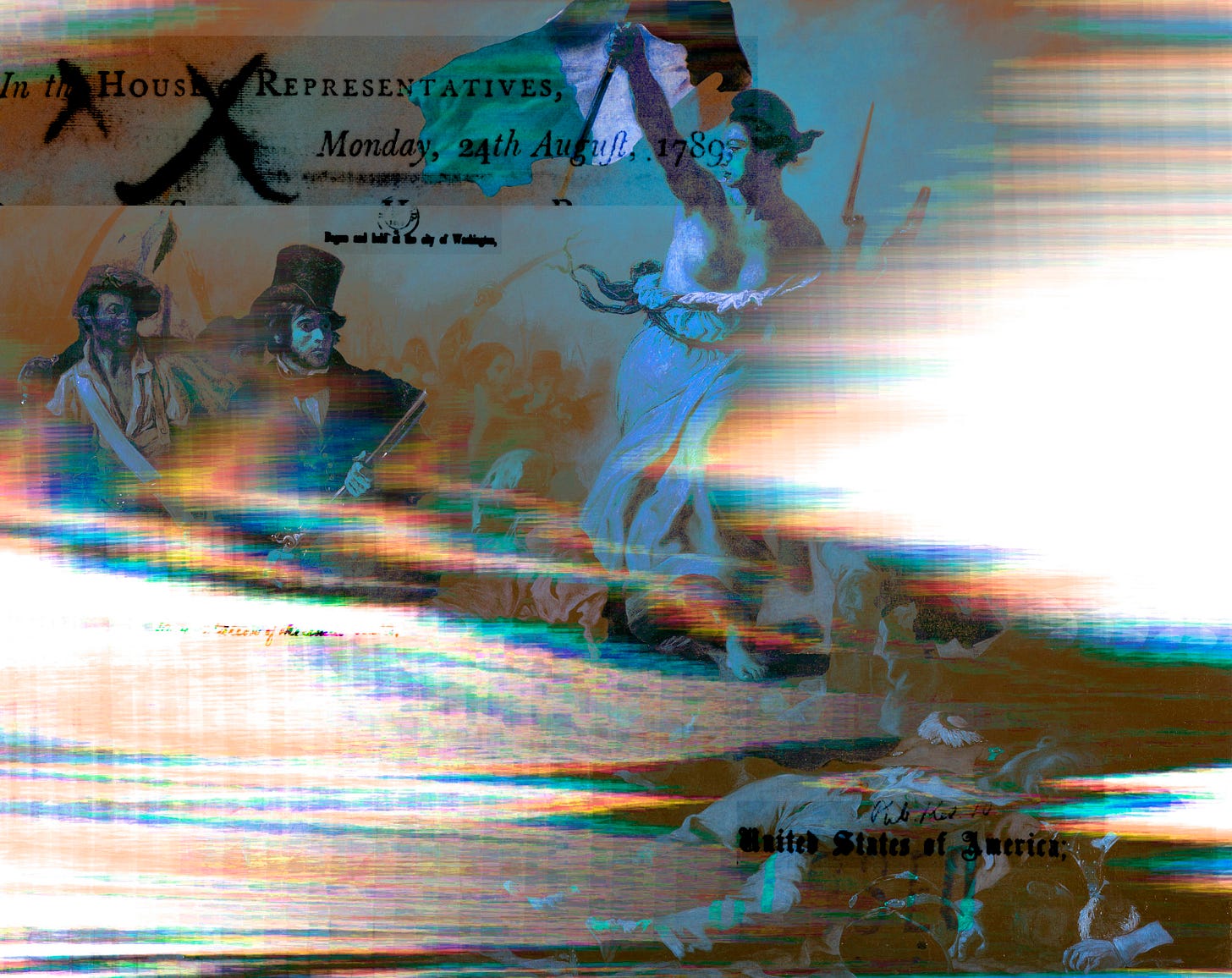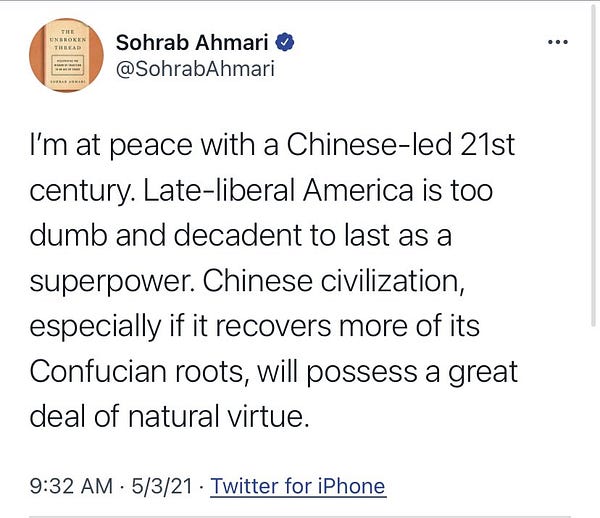Sohrab Ahmari and the Price of "Liberalism"
What we lost when we gave up the semantic battle over "classical liberalism."
I will admit to a lifetime of being the Well Akshually Guy—the one who insists on technical accuracy, particularly in the use of words, beating the rest of you down on the history and etymology of terms that you normies bandy about with casual recklessness.
For most of that time, I have been that particularly annoying and futile version of the Well Akshually Guy known as the “classical liberal.” You know us, we’re the fellow in your college dorm who insisted that “liberal” actually means “pro-freedom,” that the 19th-Century “liberals” were pro-free-marketers, and that limited government is a far more coherent concept of liberalism than, say, a government’s willingness to spend $6 trillion dollars (that it doesn’t have).
These corrections have usually been dismissed as pedantic quibbling, as a quixotic attempt to reverse a universally accepted shift in the language, as a misguided fixation on semantics rather than substance.
But maybe this issue is still relevant after all, and the Well Akshually Guys will eventually have our day in the sun.
As evidence, I submit a recent article in the Spectator by the nationalist conservative Sohrab Ahmari in which he proclaims that “Tyranny Is the Inevitable Consequence of Liberalism.” How does he reach that bizarre conclusion? Through precisely the method we classical liberals have been complaining about all these years.
It turns out it’s really easy to prove that liberalism leads to tyranny if you simply redefine “liberalism” to refer to tyranny. Ahmari does this right off the bat by describing “classical liberals” as fans of the French Revolution.
Liberals disagree over where exactly lies the line dividing the enlightened time and the dark time. “Classical” liberals tend to mark 1789, whereas “progressive” liberals—noting that much of reality since that watershed year has failed to conform to their own liberal ideal—are uncomfortable with anything not from the present or the future.
Let’s grant that Ahmari has a history of trollishness and arguing in bad faith, so it might be hard to pin him down on exactly what he means here by “1789.” But when you hear hoofbeats, you think horses, and when you hear “1789,” you think the French Revolution.
Yet what he is describing here—1789 being touted by “classical liberals” as the great historical watershed for the cause of human liberty—is not a thing that ever happens. Maybe 1787, the year the U.S. Constitution was drafted. Definitely 1776, the year the classical liberal principles of the American Revolution were proclaimed. British classical liberals might cite 1689 and its Glorious Revolution, which cast down the theory of monarchical absolutism. But the French Revolution is universally regarded by classical liberals as a model of what not to do.
I know this, you know this, and Ahmari knows this. But it doesn’t serve his preferred narrative, and that's the whole point of the dodge. It sets up the rest of the article, the basic message of which is that once there was the monarchy and the Church—and then there was the French Revolution and contemporary “wokeness.” These are the only two things that have ever happened—and the only two alternatives. All of the actual history of classical liberalism, from 1689 through 1776 and beyond, is left out because he does not want to grapple with it.
He concludes, “At some point, the liberal has to admit that the powdered-wig version of his ideology”—i.e., classical liberalism—“contained in it the seeds of its woke, repressive variety.” But Ahmari is just asserting that. He never gives a single reason or argument as to why this would be true, because he doesn’t spend a single sentence grappling with the actual ideas or history of classical liberalism. Or its implementation over a period of centuries. Nor does he spare any thought for the actual origins of modern wokeness. Ahmari attributes today’s censorious conformity to the advocates of “‘free thought’ and ‘the marketplace of ideas’.” But anyone who has ever talked to the woke kids knows that they hate the “marketplace of ideas” just as much as (and probably more than) they hate every other kind of marketplace.
Contemporary “political correctness” or “wokeness” comes from Marx and Nietzsche by way of the Postmodernists, not from John Locke or the Founding Fathers. A serious person would feel the need to at least attempt to trace some of that intellectual history and confront the ideological differences.
But like I said, that doesn’t serve the nationalist conservative narrative, which is this:
Given man’s inclination to worship, to build altars in the public square, our societies will always enshrine some orthodoxy or other (and, therefore, empower some clerisy or other). The only questions are: which orthodoxy?
In other words, there is no such thing as the limitation of power—the actual classical liberal idea. The only question is which faction wields the power. Which, ironically, is exactly the premise of the “woke” Postmodernists, too.
As for who will wield power, Ahmari recently nominated that great champion of political pluralism and religious liberty . . . China.
Like I said, there's a lot of trolling and bad faith involved here.
What is remarkable is not that Sohrab Ahmari tries to evade the entire history of classical liberalism, including the founding of America. That’s kind of his shtick. What is remarkable is that he thinks the average conservative reader will simply accept the omission. And judging from the fact that he is being published in a venerable old publication like the Spectator—and judging from what I’ve seen of the response—it looks like he’s getting away with it.
This is partly a sign of the intellectual decay of conservatism, a mass forgetting of its own intellectual foundations. But it is also a sign of the weakness of those foundations, a weakness centered on the old and seemingly irrelevant argument about the meaning of the word “liberal.”
This is the price conservatives are paying for long ago giving up on the term "liberal" and agreeing to use it to describe anything on the left, no matter how illiberal it might be. It is the price they are paying for giving up on defining their own philosophy as “liberal”—as a defense of freedom—rather than as a mere clinging to tradition.
That decision turns out not to have been merely semantic or terminological, but to have real, substantive consequences.
You may say, as the best conservatives do, that what you are trying to conserve is the American founding and its classical liberal ideas. But the act of couching your outlook as “conservative” has the effect of shifting your focus toward the preservation of the past as such and draws you into an ideological and political alliance with those for whom the value of liberal principles is secondary at best. It creates a political category that attempts to encompass the souls of both Thomas Jefferson and Archie Bunker—and ultimately cannot contain both.
That’s the crackup that is happening right now on the right. Archie Bunker conservatism—the kind that longs nostalgically for a past in which “guys like us, we had it made”—is trying to assert itself and views the classical liberals as an obstacle to be cleared out of the way. The easiest way to accomplish that is by defining us out of existence.
When you let these people paint the totalitarian woke left as “liberals,” think about how much of the glorious history of human freedom this sweeps out of existence. Think about how much you are giving up by abandoning the banner of liberalism to those who don’t deserve it.
The next time this happens, I hope you’ll hear my voice in your head, saying, “Well, actually….”




